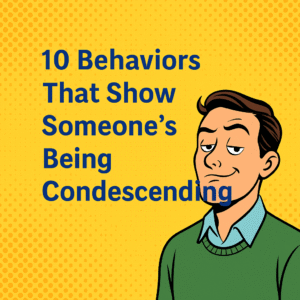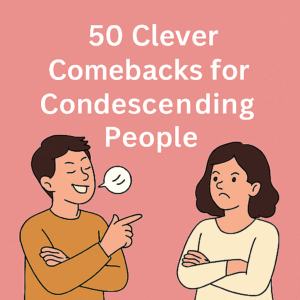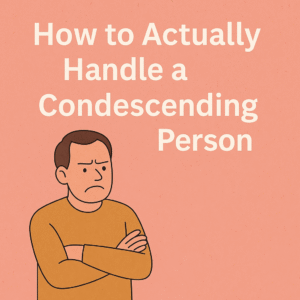How to Deal with Condescending People Without Losing Your Cool
Dealing with people who act like they know it all can be seriously annoying. These are the types who constantly try to one up you, correct you unnecessarily, or talk to you like you’re five years old. Whether it’s a coworker, friend, or someone in your family, that smug “I’m better than you” attitude can wear you down.
If you’re tired of fake smiles and biting your tongue, sometimes the best move is to be ready with a clever comeback. This guide is all about that – how to shut down condescending behavior with wit and confidence. Below are 40 smart responses you can use to hold your ground without losing your temper.
10 Behaviors That Suggest Someone’s Being Condescending

Recognizing these traits can help you decide how to handle or distance yourself from the situation:
- Talking Down to Others – They explain things in an overly simplistic or patronizing tone
- Over Explaining the Obvious – They assume you’re clueless and insist on breaking down even basic ideas
- Interrupting Frequently – They cut others off mid sentence as if only their thoughts matter
- Backhanded Compliments – Praise that’s laced with subtle insults
- Being Dismissive – They roll their eyes, wave off your points, or act like your views don’t matter
- Snide Sarcasm – Disguising insults as humor
- Unwanted Advice – They give input you never asked for, assuming you can’t figure things out on your own
- Nitpicking Publicly – Constant corrections, even over tiny mistakes, especially in front of others
- Using Overly Complex Language – Throwing in technical terms just to sound smarter
- Smug Body Language – Think smirks, sighs, or exaggerated eye rolls
50 Clever Comebacks/Roasts for a Condescending Person

- “Careful your superiority complex is slipping out”
- “Funny how loud insecurity can sound when it pretends to be confidence”
- “Climbing the ladder by stepping on others doesn’t work as well as you think”
- “All I’m hearing is someone trying too hard to sound important”
- “Didn’t know this was a competition. Should I start keeping score?”
- “Your opinion would matter more if it didn’t come with a side of arrogance”
- “That know it all button is stuck again huh?”
- “Do you always give unsolicited TED Talks?”
- “Must be exhausting pretending to know everything”
- “You seem to have mistaken yourself for the main character in my life”
- “Thanks for your two cents now I know what not to do”
- “Your talent for being smug is unmatched but not appreciated”
- “Noted. Ignored. Moving on”
- “That sounded condescending… or was that just poor communication?”
- “I’m not really in the market for your opinion”
- “Are you naturally this patronizing or did you train for it?”
- “Let’s file that under unsolicited and unhelpful”
- “Every smug word just makes me tune you out more”
- “It’s adorable how hard you try to sound insightful”
- “Is this your way of shielding your insecurities? Because it’s see through”
- “Bold take. Too bad it’s irrelevant”
- “Are you like this with everyone or am I just special?”
- “Oh another lecture? Must’ve missed that on my calendar”
- “Your favorite topic is clearly yourself”
- “Do you earn bonus points for condescending remarks?”
- “That opinion’s above my care level”
- “Sorry I don’t argue with people trying to sound superior”
- “I’m sure you meant well. It just didn’t come off that way”
- “You tearing others down says more about you than them”
- “Congrats you win today’s most smug award”
- “Does belittling others help you avoid your own flaws?”
- “Your ego is the main character in every room you walk into”
- “Was that better in your head?”
- “Carrying all that self importance must be exhausting”
- “If being full of yourself were a sport you would be undefeated”
- “Every time you talk it’s like watching a condescension masterclass”
- “Have you ever thought of teaching a course in smugness?”
- “You’d make a decent leader if you weren’t busy looking down on everyone”
- “When did our relationship become so one sided?”
- “I could’ve appreciated your advice if you didn’t sound like a snob”
- “If you were any more full of yourself, you’d need a second body.”
- “Your advice is like a fortune cookie, vague, unwanted, and completely off.”
- “You bring a lot to the table… too bad it’s all ego.”
- “Your tone says expert, but your logic says intern.”
- “You talk like Google, but your facts are straight from fantasy land.”
- “The way you assume you’re right is adorable. And completely incorrect.”
- “You should really add ‘professional interrupter’ to your resume.”
- “Every time you speak, my respect for silence grows.”
- “You’re not intimidating, you’re just loudly insecure.”
- “I’d agree with you, but then we’d both be wrong.”
How to Actually Handle a Condescending Person

You don’t always need a snappy comeback. Here’s how to handle them in a way that protects your peace:
1. Stay Composed
Getting upset gives them exactly what they want; control. Stay level headed and emotionally detached. This makes it easier to respond thoughtfully.
2. Use Humor Strategically
A light witty comment can cut through tension and take the wind out of their sails without starting a fight.
3. Set Clear Boundaries
Let them know calmly but firmly that their tone or attitude isn’t welcome. You’re not being rude. You’re just drawing the line.
4. Don’t Internalize It
Their attitude reflects their own issues not your worth. Don’t let it shake your confidence.
5. Respond Assertively Not Aggressively
Speak up with calm controlled confidence. It shows you’re not fazed or intimidated.
6. Ask Them to Explain Themselves
Turn the spotlight on them by asking things like “What do you mean by that?” This forces them to either backpedal or clarify their arrogance.
7. Agree to Disagree
Sometimes it’s best to acknowledge the difference in views and move on. You’re not giving in — you’re choosing not to waste time.
8. Surround Yourself with Respectful People
The more you experience genuine respect the easier it is to recognize and reject condescending behavior.
9. Reflect and Learn
Every tough interaction can teach you something. What worked? What didn’t? Use those lessons to handle future situations better.

Leave a Reply